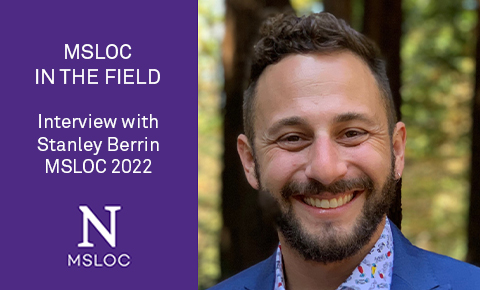DOEC in the Field: Navigating Career Transitions through People-Focused Experiential Lens with Stanley Berrin
 Our latest MSLOC community member profile with alum Stanley Berrin (MS22) is based on a live interview conversation, conducted via Zoom, in January 2024.
Our latest MSLOC community member profile with alum Stanley Berrin (MS22) is based on a live interview conversation, conducted via Zoom, in January 2024.
Please introduce yourself and share a little about your professional background before and after completing the Designing for Organizational Effectiveness Certificate (DOEC).
I worked for around 10 years in experiential education before joining the MSLOC and DOEC programs. This path was never really planned; I just somersaulted my way into the learning space when I started running after school programs and summer camps for the Jewish Community Centre of the East Bay. I took some time off and travelled for a year to immerse myself in different cultural experiences. Inspired by this exposure, I started working with an experiential education firm that organized adventure and community service experiences in Costa Rica for high school students. While I loved this job, I didn’t see many opportunities for continued growth and refocused on the next career steps. I took up a sales role with a start-up but unfortunately, the whole team was laid off during Covid.
I took a moment to recentre myself and reflect on the next move. I looked at programs that aligned with my values and interests; holistic, intentional and people focused. I was keen on exploring mediums which would facilitate team collaboration through lived experiences and diverse perspectives. MSLOC and DOEC effectively ticked all the boxes for me.
I currently work as Senior Consultant in organizational change, communication and learning. I like to describe myself as an empathetic connector who listens to clients and centers their challenges around the impacted audiences. I love to facilitate client and team conversations with creativity and curiosity while helping people feel acknowledged and strive to pair project success with interpersonal connectivity and growth.
How has the Designing for Organizational Effectiveness Certificate (DOEC) influenced your career trajectory?
DOEC, and I would like to extrapolate to MSLOC as well, has provided a holistic and intentional approach to my work, facilitating a smooth transition into my current consulting role. The focus on design thinking has been particularly impactful, emphasizing the importance of understanding end-users' perspectives and needs. By nature, I am very solution-oriented, and this approach helps me pause, reflect and design more consciously.
The program really helped me develop and hone my interviewing skills. As a consultant, interacting with clients and end users forms bulk of my job. The course has helped me be more curious and ask the right questions to get a broader outlook on the problem space.
How has being part of the community benefited you in terms of connections and/or collaborations?
The MSLOC and DOEC community plays a big role in my journey. The supportiveness and willingness of cohort members, instructors and alumni to offer time, advice, and collaboration opportunities have been instrumental in my success. Leveraging the network, I found my current job at TiER1 Performance, where the alignment of their consulting approach with the program values created a seamless transition for me. People are truly interested in supporting and lifting others in the community. I aspire to truly embody these community values and do my best to pay it forward; I have realized that even when the contribution is small, the impact can be mighty.
What advice would you give to current or potential students pursuing the Designing for Organizational Effectiveness Certificate?
Reflecting on my own journey, I have a few key pieces of advice for current and potential students. I encourage everyone to take full advantage of every opportunity available within the program; whether it's extra discussions, lectures, or extracurricular activities, these experiences can enrich your learning journey significantly.
I would ask students to find practical applications for the theories and methodologies learned in the program. Applying concepts to real-life situations, even in small personal projects, enhances understanding and makes the learning experience more tangible. Even daily activities or personal endeavours can serve as a testing ground for applying organizational effectiveness principles.
Lastly, build connections within the MSLOC and DOEC community. Don't hesitate to reach out to instructors, peers, or alumni for discussions and guidance. The network proves to be a powerful resource for mentorship, collaboration, and ongoing support beyond the duration of the program.
-----------
MSLOC in the Field is a series where community members share perspectives on their professional journeys and the roles MSLOC has played in advancing their learning and career goals.
About Stanley Berrin: Focusing on people has always been Stan's orientation no matter the setting or subject. As a Senior Consultant working in Organizational Change, Communication and Learning, he thrives as an empathetic connection who listens to clients and centers their challenges around the impacted audiences. With a background in experiential education, he loves to facilitate client and team member conversations with engaging creativity and curiosity. Stan cares deeply about helping people feel heard and acknowledged, and always strives to pair project success with interpersonal connectivity and growth.